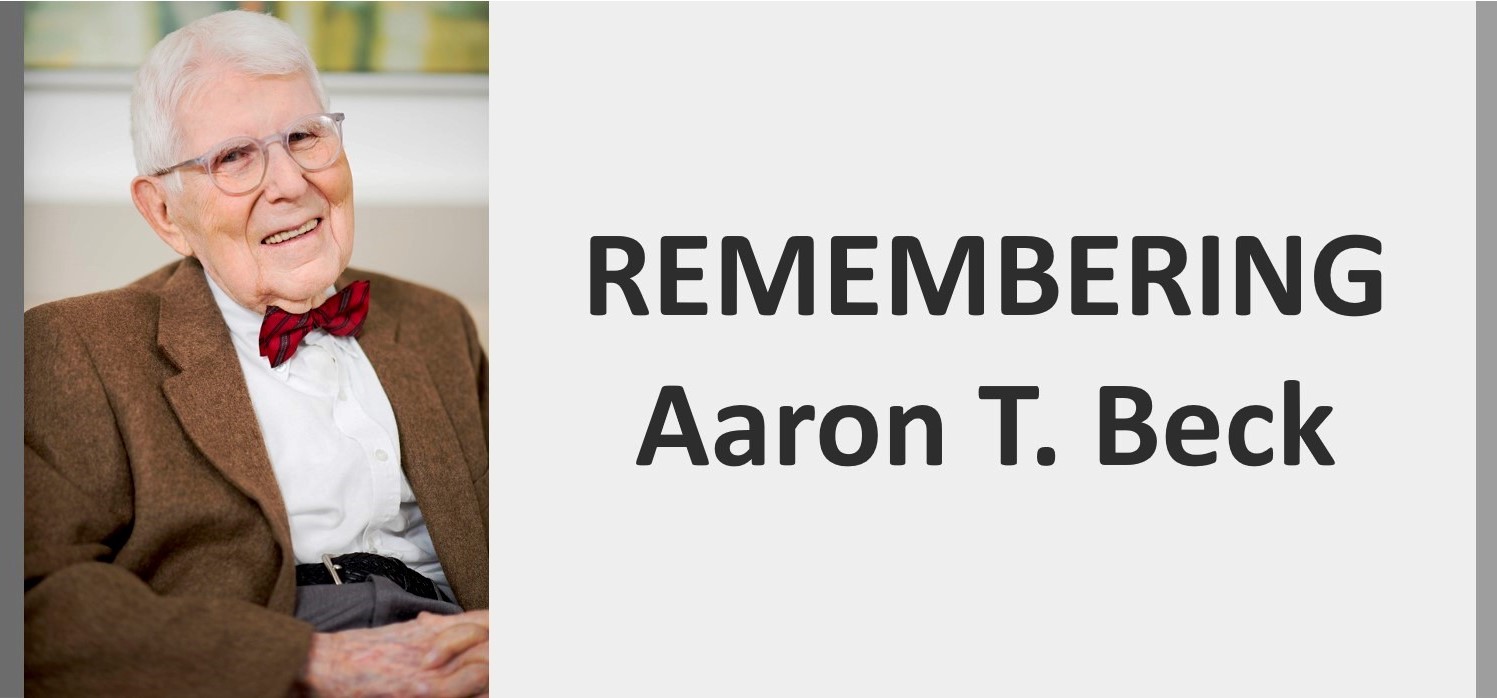
Sad News
Sadly, Aaron (Tim) Beck died last week, on 1 November 2021, 107 days after his 100th birthday.
The developer of CBT as the world's most popular treatment for depression and anxiety had an enormous impact in helping millions across the world in a way rarely matched over the last 100 years. Whilst there will be much debate over the coming months about his impact and what the nature of his posthumous recognition should be, I simply wanted to share some of my own personal thoughts and experiences of him.
Like many who are drawn into the psychology and psychotherapy field, I was influenced by personal issues that I grappled with during adolescence.
Early on I was struck by two things – firstly that I couldn’t change my past (no matter how much I wanted to). However, I could change my attitude towards it. You will notice that SDS’ “motto” is a quotation from William James “The greatest discovery of my generation is that human beings can alter their lives by altering their attitudes of mind.”
Tim Beck was the psychotherapist who embodied that attitude into a way of thinking about the self, others and the world into a highly developed method of helping both oneself and others. In doing so, he, undoubtedly, influenced the creation of SDS – over thirty years ago as a forum, in which to promote the ideas of changing one’s life through changing one’s thinking and attitudes, which were at the core of his psychotherapy. That process continues today as it will over the decades to come whether through us of other carriers of the flame. Having said this, my discovery of Tim Beck as a clinical psychologist, didn’t occur until the early 1990s. His work had been developed as early as the 1960s but he didn’t really impact on British Clinical Psychology until the late 1980s.
He immediately appealed to me – in part because of his therapy but also because he philosophically and personally combined an unusual range of opposites. He was a psychiatrist who had no real interest in psychiatry (his original love was neurology). He originally trained as a psychoanalyst but was a passionate believer in experimental method. His use of Randomised Controlled Trials in the 1970s to validate the effectiveness for CBT was something that was seen as cutting edge even within physical medicine at the time and totally unknown in psychotherapy field. Even today it is one of the aspects of CBT that sets it apart from most other psychotherapies. A believer in a directive approach in therapy, he nonetheless saw client self-discovery and collaboration as essential. The influence of Rogers in that regard, meant he put Socratic Questioning centre stage and set him apart from that other giant in the cognitive therapy field – Al Ellis. Because of his scientific background he was also a firm believer that any psychotherapeutic treatment should derive from a scientific model. Hence he ensured that CBT was never generic but involved different strategies according to the problem worked with and an underlying understanding of its unique processes. Never a one theory fits all approach by any stretch of the imagination.
I worked with Tim Beck briefly almost 8 years ago over a long training he ran with his daughter Judith.
My memories of that time are striking. My first one is that I remember him smelling of moth balls and wondering both why that was and whether I should ask him about it. I decided (probably wisely) not to. Secondly, I was staggered by his mental sharpness as well as his insight (at 92!). He offered valuable comments regarding a stuck client I was working with and was an enthusiastic user of role play as a supervision technique. His compassion, clinical insight and academic brightness shone through equally.
I felt quite overwhelmed by his presence and intellect, and, a bit child-like, took pride in the fact when out of many questions asked during the training, he chose four, three of which were mine! It stays with me to this day as a proud moment. And it was his answer to my question “Why do you think CBT works?” that has affected me most profoundly. He started answering with reference to a binocular rivalry experiment he had conducted many years before. Without me going into the academic detail here, his conclusion was that CBT enables humans innate positivity to be released. An answer that brings him much closer to both Maslow and Rogers than many would’ve guessed.
You can watch this moment on video, and spot me in the front row, proving how keen I was on learning from a Master:
If you’re looking for scientifically proven strategies to release your or your clients’ innate positivity you wouldn’t go far wrong in studying what this man had to offer, and will continue to offer for decades to come.
I hope you will join me in giving a few moments of your time to remembering this man – one of the world’s most influential thinkers and doers of the last 100 years.
Yours sincerely,
Paul
